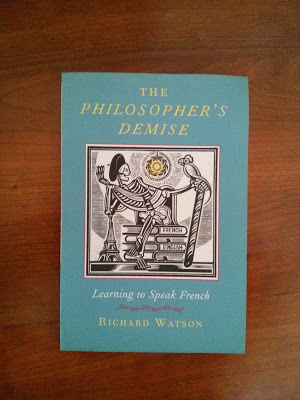What can one do after failing to achieve something? Learning from failure is a good way to utilise one’s painful experience. Writing a book about your failure and letting other people learn from it is even better. First, you help others avoid the mistakes you made, second, you can heal your wounded ego with the additional income. Here it is: The Philosopher Demise by Richard Watson, a book about the author’s failure to learn to speak French.
I found a reference to this book in another work dedicated to second language acquisition studies. The book was mentioned as an interesting and unlikely case. In brief, here is the story: Richard Watson is a professor of philosophy and a Cartesian scholar. He could read original Descartes’ works easily, yet he never managed to learn to speak French despite trying very hard and employing all possible means, including a long stay in Paris and taking very prestigious French courses.
As a linguist, I’m convinced that anyone who once acquired one language as a mother-tongue is capable to acquire other languages. The time one can dedicate to a new language is the only limitation. The professor had a tremendous exposure to French – he read and translated a considerable amount of books in French, so he had to grasp French grammar patterns and gain extensive, sophisticated vocabulary. No doubt, speaking is the hardest language skill to develop and it always comes last. However, after years of working with French, how could he have failed speaking? This puzzled me so much that I bought the book to learn the details of his intriguing failure.
The book turned out to be an enjoyable reading. With a good self-irony, Richard Watson confides how he fought with French language and, to a certain degree, with French culture. This is both the story of an English-speaking person learning a foreign language and an American in Paris. His anecdotal evidence of many cultural incompatibilities is written in a humorous manner, but don’t let the light elegancy of the book to fool you. This failure story reveals a very important truth about language learning: you have to embrace a new culture in order to acquire a new language. Trivial as it may sound, this truth is so often overlooked and underestimated. Language courses may teach you some grammar and word usage, but it’s your job to fall in love with the culture.
Richard Watson describes with an academic accuracy the learning techniques and practices he tried. He comments on each teaching method he was exposed to, saying what worked and what didn’t, and why. I am both a language teacher and a language learner, and I couldn’t resist comparing my experience to his (and that of his teachers). If you could observe me reading this book, you would hear: “I wouldn’t do that! ”, “ Oh, my students might feel the same!”, “Good, I thought about this in advance!”.
I believe, I satisfied my curiosity and found the answers to the questions that puzzled me. Now I know why one can fail to learn to speak a language despite the fact that the circumstances were more than beneficial. No worries, I won’t spoil you the reading. What is important, I still believe that we all are capable to speak more than one language.

